Contribution of HRM in Organisational Efficiency and Effectiveness
VerifiedAdded on 2020/05/08
|8
|2633
|206
Essay
AI Summary
This essay meticulously examines the significant contribution of Human Resource Management (HRM) to organisational efficiency and effectiveness. It delves into various HRM practices, including job analysis and design, recruitment and selection, industrial relations, and diversity management, highlighting their impact on employee performance and overall organisational success. The essay discusses how HRM strategies such as compensation policies, performance appraisals, and training programs directly influence productivity and the ability of a company to achieve its goals. It also explores the evolution of HRM, the challenges faced by modern HRM, and the importance of aligning HRM practices with corporate culture and objectives. Furthermore, the essay references various studies and research to support its claims, emphasising the strategic role of HRM in enhancing a company's competitive advantage and ensuring its long-term success. The essay concludes by summarising the key findings and reiterating the crucial role of HRM in maintaining organisational efficiency and effectiveness in today's dynamic business environment.
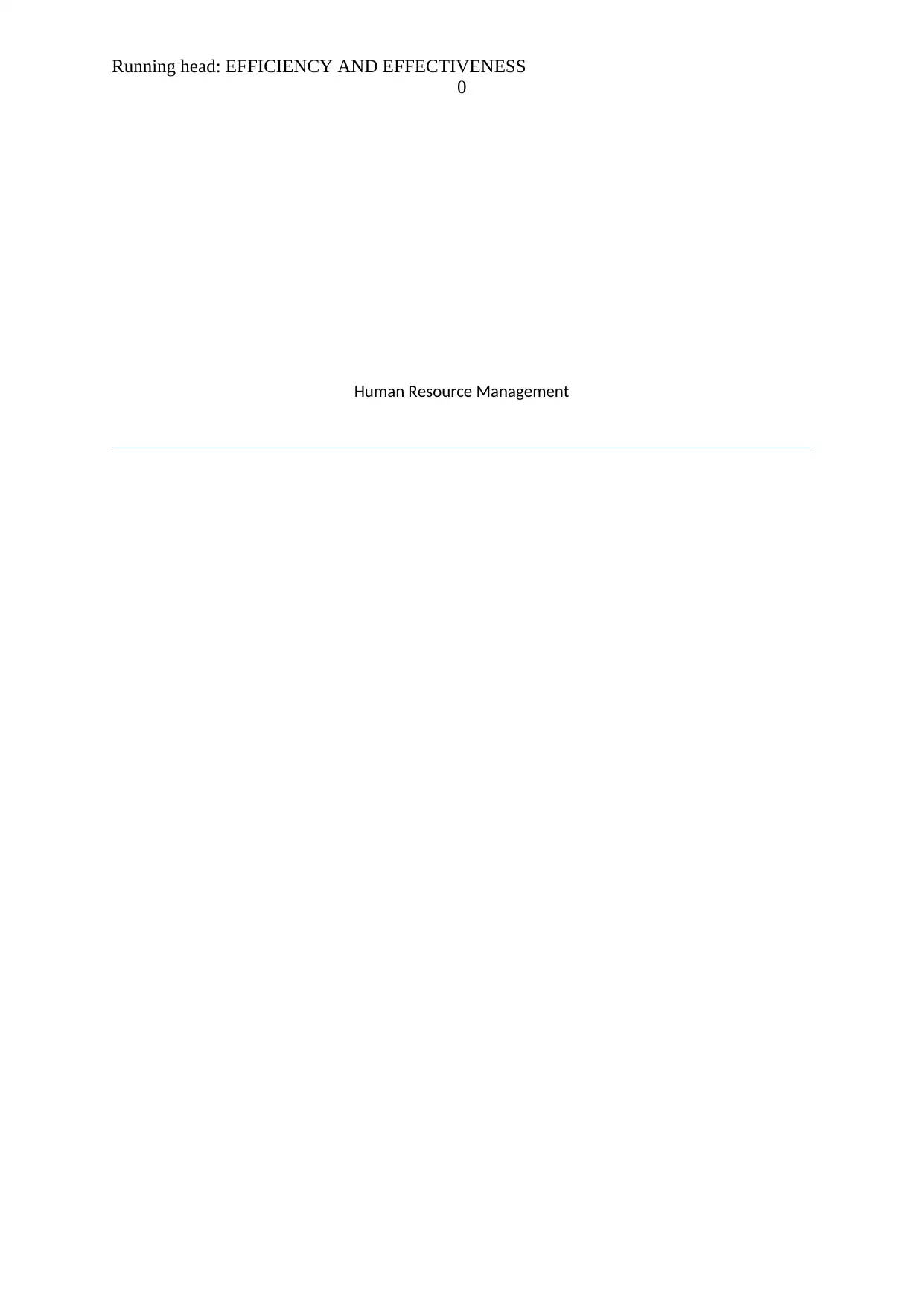
Running head: EFFICIENCY AND EFFECTIVENESS
0
Human Resource Management
0
Human Resource Management
Paraphrase This Document
Need a fresh take? Get an instant paraphrase of this document with our AI Paraphraser
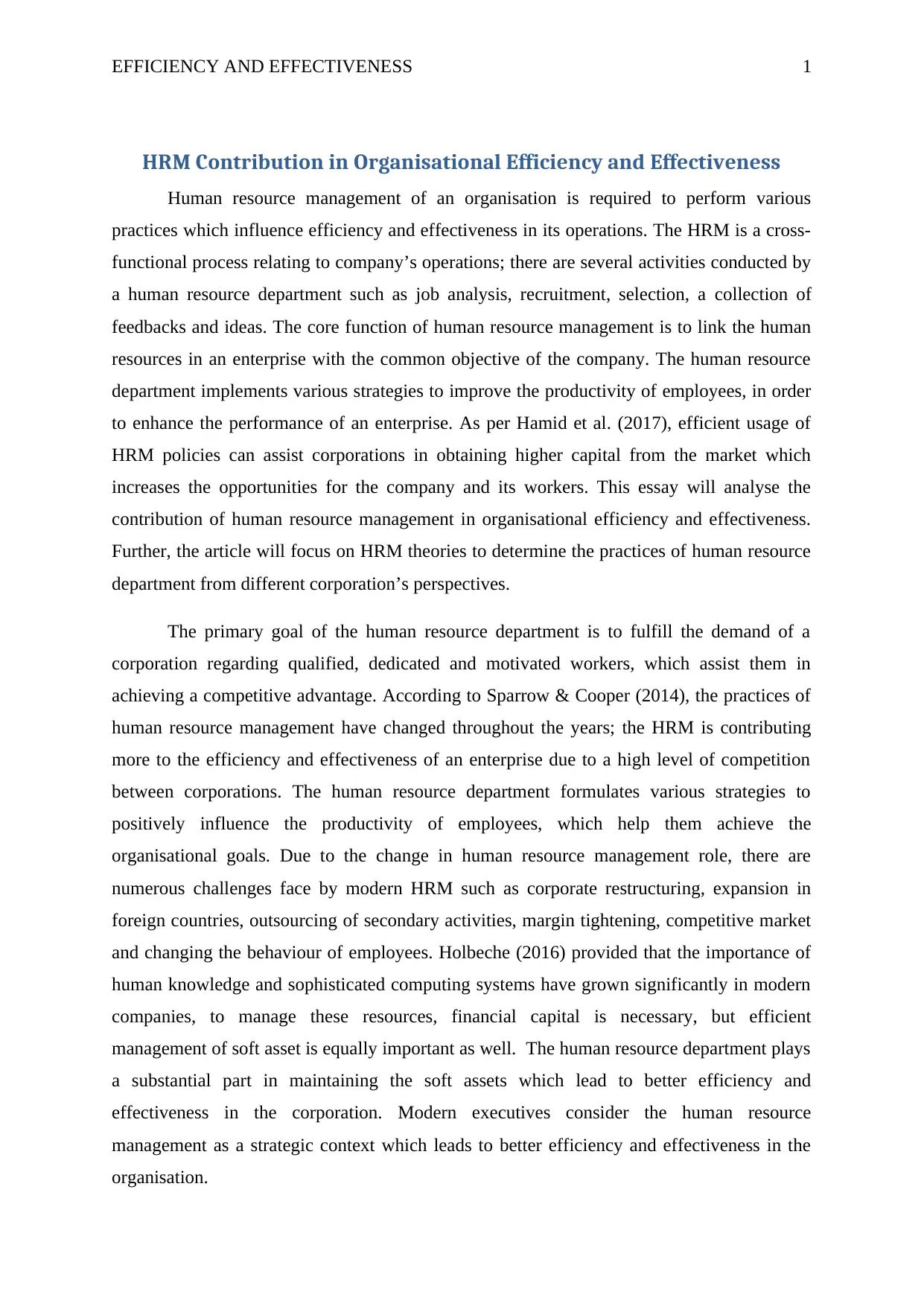
EFFICIENCY AND EFFECTIVENESS 1
HRM Contribution in Organisational Efficiency and Effectiveness
Human resource management of an organisation is required to perform various
practices which influence efficiency and effectiveness in its operations. The HRM is a cross-
functional process relating to company’s operations; there are several activities conducted by
a human resource department such as job analysis, recruitment, selection, a collection of
feedbacks and ideas. The core function of human resource management is to link the human
resources in an enterprise with the common objective of the company. The human resource
department implements various strategies to improve the productivity of employees, in order
to enhance the performance of an enterprise. As per Hamid et al. (2017), efficient usage of
HRM policies can assist corporations in obtaining higher capital from the market which
increases the opportunities for the company and its workers. This essay will analyse the
contribution of human resource management in organisational efficiency and effectiveness.
Further, the article will focus on HRM theories to determine the practices of human resource
department from different corporation’s perspectives.
The primary goal of the human resource department is to fulfill the demand of a
corporation regarding qualified, dedicated and motivated workers, which assist them in
achieving a competitive advantage. According to Sparrow & Cooper (2014), the practices of
human resource management have changed throughout the years; the HRM is contributing
more to the efficiency and effectiveness of an enterprise due to a high level of competition
between corporations. The human resource department formulates various strategies to
positively influence the productivity of employees, which help them achieve the
organisational goals. Due to the change in human resource management role, there are
numerous challenges face by modern HRM such as corporate restructuring, expansion in
foreign countries, outsourcing of secondary activities, margin tightening, competitive market
and changing the behaviour of employees. Holbeche (2016) provided that the importance of
human knowledge and sophisticated computing systems have grown significantly in modern
companies, to manage these resources, financial capital is necessary, but efficient
management of soft asset is equally important as well. The human resource department plays
a substantial part in maintaining the soft assets which lead to better efficiency and
effectiveness in the corporation. Modern executives consider the human resource
management as a strategic context which leads to better efficiency and effectiveness in the
organisation.
HRM Contribution in Organisational Efficiency and Effectiveness
Human resource management of an organisation is required to perform various
practices which influence efficiency and effectiveness in its operations. The HRM is a cross-
functional process relating to company’s operations; there are several activities conducted by
a human resource department such as job analysis, recruitment, selection, a collection of
feedbacks and ideas. The core function of human resource management is to link the human
resources in an enterprise with the common objective of the company. The human resource
department implements various strategies to improve the productivity of employees, in order
to enhance the performance of an enterprise. As per Hamid et al. (2017), efficient usage of
HRM policies can assist corporations in obtaining higher capital from the market which
increases the opportunities for the company and its workers. This essay will analyse the
contribution of human resource management in organisational efficiency and effectiveness.
Further, the article will focus on HRM theories to determine the practices of human resource
department from different corporation’s perspectives.
The primary goal of the human resource department is to fulfill the demand of a
corporation regarding qualified, dedicated and motivated workers, which assist them in
achieving a competitive advantage. According to Sparrow & Cooper (2014), the practices of
human resource management have changed throughout the years; the HRM is contributing
more to the efficiency and effectiveness of an enterprise due to a high level of competition
between corporations. The human resource department formulates various strategies to
positively influence the productivity of employees, which help them achieve the
organisational goals. Due to the change in human resource management role, there are
numerous challenges face by modern HRM such as corporate restructuring, expansion in
foreign countries, outsourcing of secondary activities, margin tightening, competitive market
and changing the behaviour of employees. Holbeche (2016) provided that the importance of
human knowledge and sophisticated computing systems have grown significantly in modern
companies, to manage these resources, financial capital is necessary, but efficient
management of soft asset is equally important as well. The human resource department plays
a substantial part in maintaining the soft assets which lead to better efficiency and
effectiveness in the corporation. Modern executives consider the human resource
management as a strategic context which leads to better efficiency and effectiveness in the
organisation.
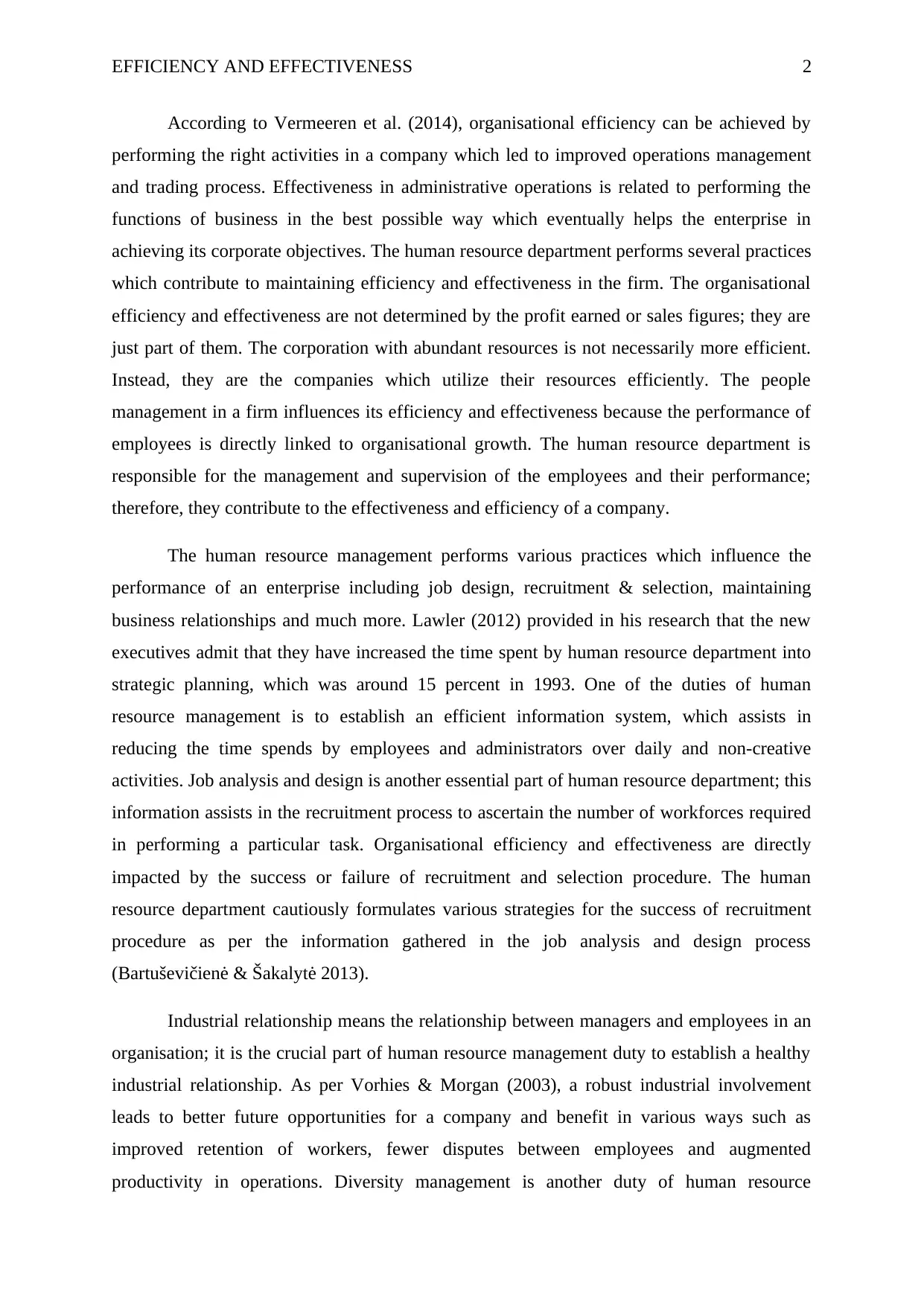
EFFICIENCY AND EFFECTIVENESS 2
According to Vermeeren et al. (2014), organisational efficiency can be achieved by
performing the right activities in a company which led to improved operations management
and trading process. Effectiveness in administrative operations is related to performing the
functions of business in the best possible way which eventually helps the enterprise in
achieving its corporate objectives. The human resource department performs several practices
which contribute to maintaining efficiency and effectiveness in the firm. The organisational
efficiency and effectiveness are not determined by the profit earned or sales figures; they are
just part of them. The corporation with abundant resources is not necessarily more efficient.
Instead, they are the companies which utilize their resources efficiently. The people
management in a firm influences its efficiency and effectiveness because the performance of
employees is directly linked to organisational growth. The human resource department is
responsible for the management and supervision of the employees and their performance;
therefore, they contribute to the effectiveness and efficiency of a company.
The human resource management performs various practices which influence the
performance of an enterprise including job design, recruitment & selection, maintaining
business relationships and much more. Lawler (2012) provided in his research that the new
executives admit that they have increased the time spent by human resource department into
strategic planning, which was around 15 percent in 1993. One of the duties of human
resource management is to establish an efficient information system, which assists in
reducing the time spends by employees and administrators over daily and non-creative
activities. Job analysis and design is another essential part of human resource department; this
information assists in the recruitment process to ascertain the number of workforces required
in performing a particular task. Organisational efficiency and effectiveness are directly
impacted by the success or failure of recruitment and selection procedure. The human
resource department cautiously formulates various strategies for the success of recruitment
procedure as per the information gathered in the job analysis and design process
(Bartuševičienė & Šakalytė 2013).
Industrial relationship means the relationship between managers and employees in an
organisation; it is the crucial part of human resource management duty to establish a healthy
industrial relationship. As per Vorhies & Morgan (2003), a robust industrial involvement
leads to better future opportunities for a company and benefit in various ways such as
improved retention of workers, fewer disputes between employees and augmented
productivity in operations. Diversity management is another duty of human resource
According to Vermeeren et al. (2014), organisational efficiency can be achieved by
performing the right activities in a company which led to improved operations management
and trading process. Effectiveness in administrative operations is related to performing the
functions of business in the best possible way which eventually helps the enterprise in
achieving its corporate objectives. The human resource department performs several practices
which contribute to maintaining efficiency and effectiveness in the firm. The organisational
efficiency and effectiveness are not determined by the profit earned or sales figures; they are
just part of them. The corporation with abundant resources is not necessarily more efficient.
Instead, they are the companies which utilize their resources efficiently. The people
management in a firm influences its efficiency and effectiveness because the performance of
employees is directly linked to organisational growth. The human resource department is
responsible for the management and supervision of the employees and their performance;
therefore, they contribute to the effectiveness and efficiency of a company.
The human resource management performs various practices which influence the
performance of an enterprise including job design, recruitment & selection, maintaining
business relationships and much more. Lawler (2012) provided in his research that the new
executives admit that they have increased the time spent by human resource department into
strategic planning, which was around 15 percent in 1993. One of the duties of human
resource management is to establish an efficient information system, which assists in
reducing the time spends by employees and administrators over daily and non-creative
activities. Job analysis and design is another essential part of human resource department; this
information assists in the recruitment process to ascertain the number of workforces required
in performing a particular task. Organisational efficiency and effectiveness are directly
impacted by the success or failure of recruitment and selection procedure. The human
resource department cautiously formulates various strategies for the success of recruitment
procedure as per the information gathered in the job analysis and design process
(Bartuševičienė & Šakalytė 2013).
Industrial relationship means the relationship between managers and employees in an
organisation; it is the crucial part of human resource management duty to establish a healthy
industrial relationship. As per Vorhies & Morgan (2003), a robust industrial involvement
leads to better future opportunities for a company and benefit in various ways such as
improved retention of workers, fewer disputes between employees and augmented
productivity in operations. Diversity management is another duty of human resource
⊘ This is a preview!⊘
Do you want full access?
Subscribe today to unlock all pages.

Trusted by 1+ million students worldwide
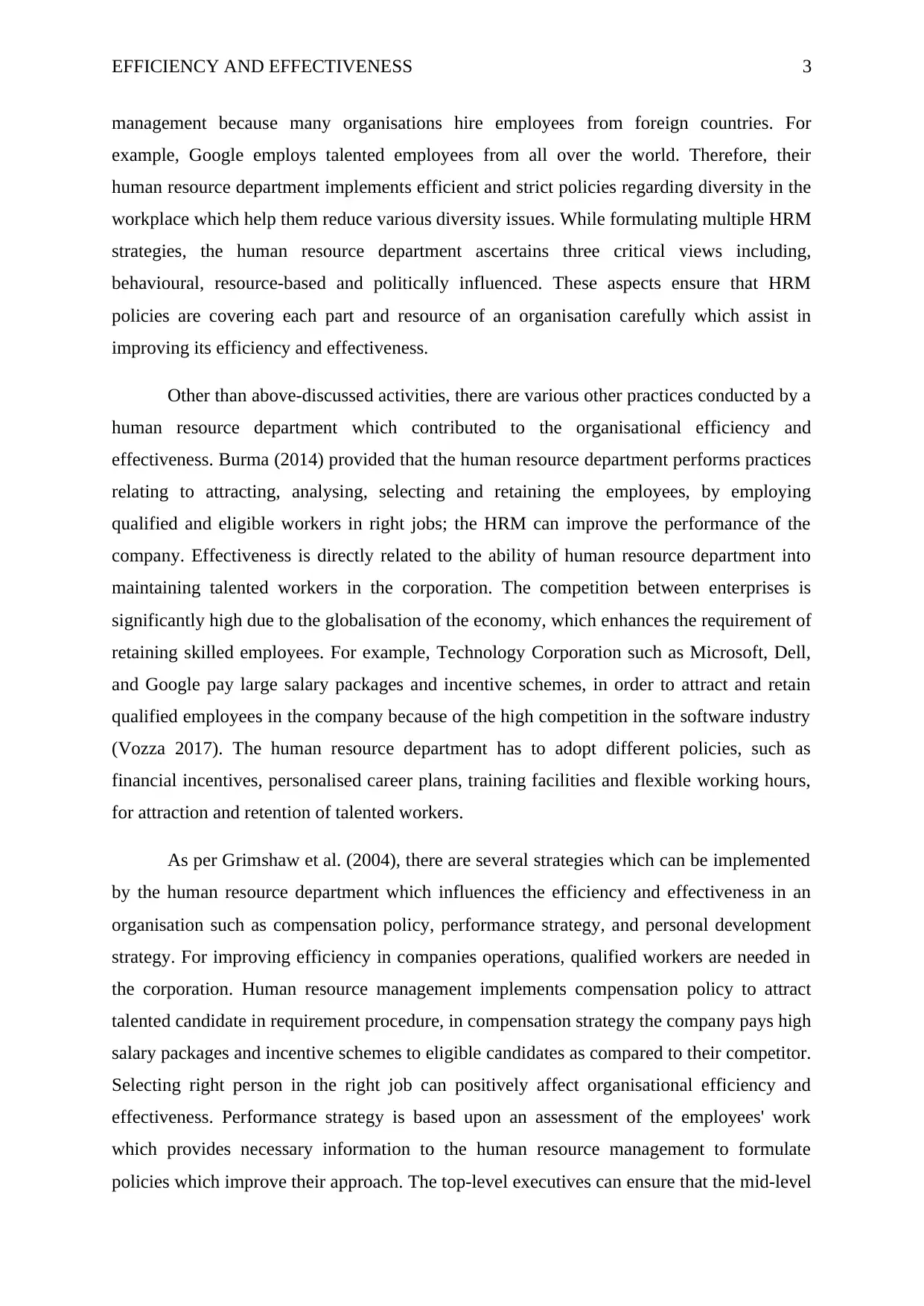
EFFICIENCY AND EFFECTIVENESS 3
management because many organisations hire employees from foreign countries. For
example, Google employs talented employees from all over the world. Therefore, their
human resource department implements efficient and strict policies regarding diversity in the
workplace which help them reduce various diversity issues. While formulating multiple HRM
strategies, the human resource department ascertains three critical views including,
behavioural, resource-based and politically influenced. These aspects ensure that HRM
policies are covering each part and resource of an organisation carefully which assist in
improving its efficiency and effectiveness.
Other than above-discussed activities, there are various other practices conducted by a
human resource department which contributed to the organisational efficiency and
effectiveness. Burma (2014) provided that the human resource department performs practices
relating to attracting, analysing, selecting and retaining the employees, by employing
qualified and eligible workers in right jobs; the HRM can improve the performance of the
company. Effectiveness is directly related to the ability of human resource department into
maintaining talented workers in the corporation. The competition between enterprises is
significantly high due to the globalisation of the economy, which enhances the requirement of
retaining skilled employees. For example, Technology Corporation such as Microsoft, Dell,
and Google pay large salary packages and incentive schemes, in order to attract and retain
qualified employees in the company because of the high competition in the software industry
(Vozza 2017). The human resource department has to adopt different policies, such as
financial incentives, personalised career plans, training facilities and flexible working hours,
for attraction and retention of talented workers.
As per Grimshaw et al. (2004), there are several strategies which can be implemented
by the human resource department which influences the efficiency and effectiveness in an
organisation such as compensation policy, performance strategy, and personal development
strategy. For improving efficiency in companies operations, qualified workers are needed in
the corporation. Human resource management implements compensation policy to attract
talented candidate in requirement procedure, in compensation strategy the company pays high
salary packages and incentive schemes to eligible candidates as compared to their competitor.
Selecting right person in the right job can positively affect organisational efficiency and
effectiveness. Performance strategy is based upon an assessment of the employees' work
which provides necessary information to the human resource management to formulate
policies which improve their approach. The top-level executives can ensure that the mid-level
management because many organisations hire employees from foreign countries. For
example, Google employs talented employees from all over the world. Therefore, their
human resource department implements efficient and strict policies regarding diversity in the
workplace which help them reduce various diversity issues. While formulating multiple HRM
strategies, the human resource department ascertains three critical views including,
behavioural, resource-based and politically influenced. These aspects ensure that HRM
policies are covering each part and resource of an organisation carefully which assist in
improving its efficiency and effectiveness.
Other than above-discussed activities, there are various other practices conducted by a
human resource department which contributed to the organisational efficiency and
effectiveness. Burma (2014) provided that the human resource department performs practices
relating to attracting, analysing, selecting and retaining the employees, by employing
qualified and eligible workers in right jobs; the HRM can improve the performance of the
company. Effectiveness is directly related to the ability of human resource department into
maintaining talented workers in the corporation. The competition between enterprises is
significantly high due to the globalisation of the economy, which enhances the requirement of
retaining skilled employees. For example, Technology Corporation such as Microsoft, Dell,
and Google pay large salary packages and incentive schemes, in order to attract and retain
qualified employees in the company because of the high competition in the software industry
(Vozza 2017). The human resource department has to adopt different policies, such as
financial incentives, personalised career plans, training facilities and flexible working hours,
for attraction and retention of talented workers.
As per Grimshaw et al. (2004), there are several strategies which can be implemented
by the human resource department which influences the efficiency and effectiveness in an
organisation such as compensation policy, performance strategy, and personal development
strategy. For improving efficiency in companies operations, qualified workers are needed in
the corporation. Human resource management implements compensation policy to attract
talented candidate in requirement procedure, in compensation strategy the company pays high
salary packages and incentive schemes to eligible candidates as compared to their competitor.
Selecting right person in the right job can positively affect organisational efficiency and
effectiveness. Performance strategy is based upon an assessment of the employees' work
which provides necessary information to the human resource management to formulate
policies which improve their approach. The top-level executives can ensure that the mid-level
Paraphrase This Document
Need a fresh take? Get an instant paraphrase of this document with our AI Paraphraser
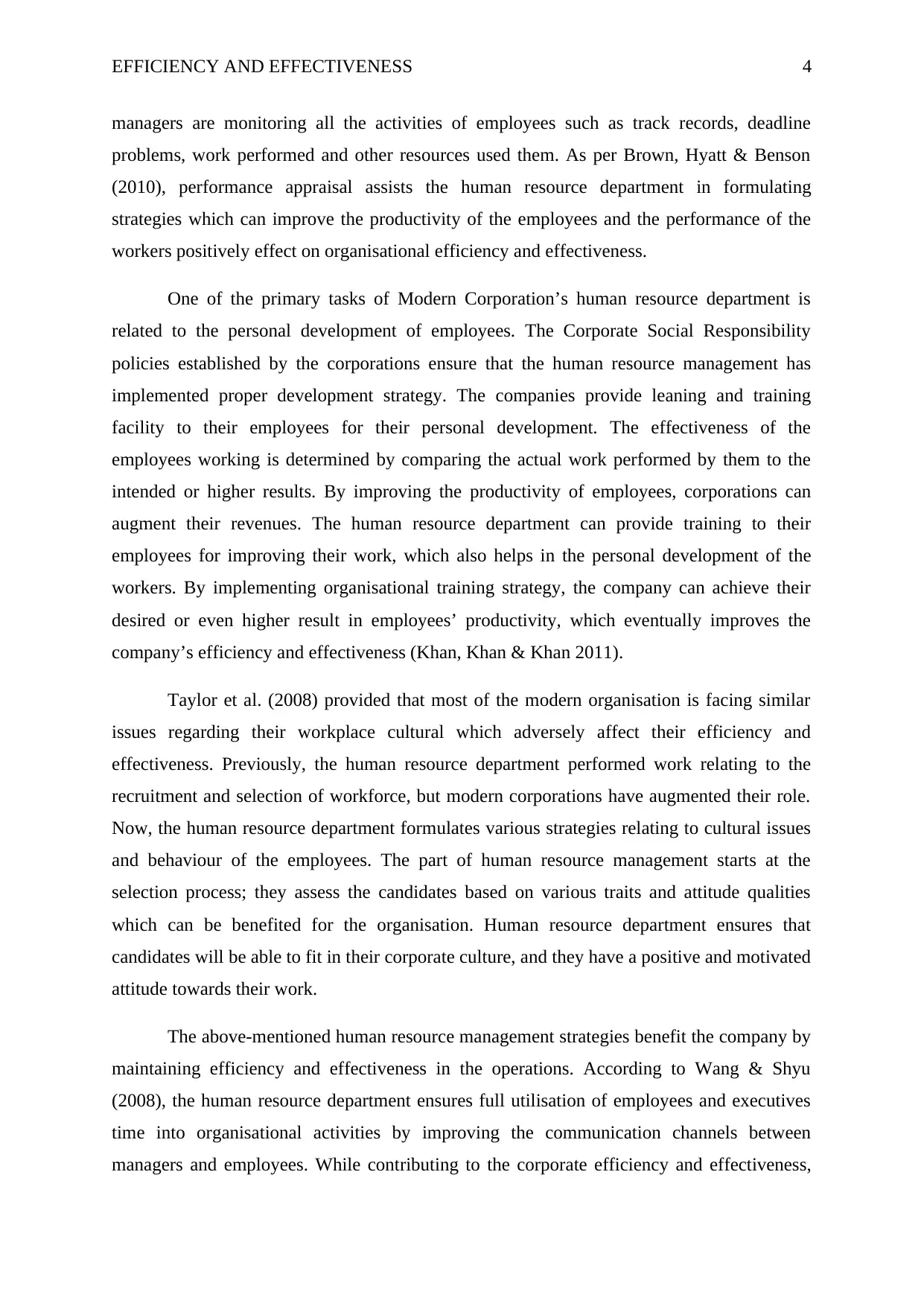
EFFICIENCY AND EFFECTIVENESS 4
managers are monitoring all the activities of employees such as track records, deadline
problems, work performed and other resources used them. As per Brown, Hyatt & Benson
(2010), performance appraisal assists the human resource department in formulating
strategies which can improve the productivity of the employees and the performance of the
workers positively effect on organisational efficiency and effectiveness.
One of the primary tasks of Modern Corporation’s human resource department is
related to the personal development of employees. The Corporate Social Responsibility
policies established by the corporations ensure that the human resource management has
implemented proper development strategy. The companies provide leaning and training
facility to their employees for their personal development. The effectiveness of the
employees working is determined by comparing the actual work performed by them to the
intended or higher results. By improving the productivity of employees, corporations can
augment their revenues. The human resource department can provide training to their
employees for improving their work, which also helps in the personal development of the
workers. By implementing organisational training strategy, the company can achieve their
desired or even higher result in employees’ productivity, which eventually improves the
company’s efficiency and effectiveness (Khan, Khan & Khan 2011).
Taylor et al. (2008) provided that most of the modern organisation is facing similar
issues regarding their workplace cultural which adversely affect their efficiency and
effectiveness. Previously, the human resource department performed work relating to the
recruitment and selection of workforce, but modern corporations have augmented their role.
Now, the human resource department formulates various strategies relating to cultural issues
and behaviour of the employees. The part of human resource management starts at the
selection process; they assess the candidates based on various traits and attitude qualities
which can be benefited for the organisation. Human resource department ensures that
candidates will be able to fit in their corporate culture, and they have a positive and motivated
attitude towards their work.
The above-mentioned human resource management strategies benefit the company by
maintaining efficiency and effectiveness in the operations. According to Wang & Shyu
(2008), the human resource department ensures full utilisation of employees and executives
time into organisational activities by improving the communication channels between
managers and employees. While contributing to the corporate efficiency and effectiveness,
managers are monitoring all the activities of employees such as track records, deadline
problems, work performed and other resources used them. As per Brown, Hyatt & Benson
(2010), performance appraisal assists the human resource department in formulating
strategies which can improve the productivity of the employees and the performance of the
workers positively effect on organisational efficiency and effectiveness.
One of the primary tasks of Modern Corporation’s human resource department is
related to the personal development of employees. The Corporate Social Responsibility
policies established by the corporations ensure that the human resource management has
implemented proper development strategy. The companies provide leaning and training
facility to their employees for their personal development. The effectiveness of the
employees working is determined by comparing the actual work performed by them to the
intended or higher results. By improving the productivity of employees, corporations can
augment their revenues. The human resource department can provide training to their
employees for improving their work, which also helps in the personal development of the
workers. By implementing organisational training strategy, the company can achieve their
desired or even higher result in employees’ productivity, which eventually improves the
company’s efficiency and effectiveness (Khan, Khan & Khan 2011).
Taylor et al. (2008) provided that most of the modern organisation is facing similar
issues regarding their workplace cultural which adversely affect their efficiency and
effectiveness. Previously, the human resource department performed work relating to the
recruitment and selection of workforce, but modern corporations have augmented their role.
Now, the human resource department formulates various strategies relating to cultural issues
and behaviour of the employees. The part of human resource management starts at the
selection process; they assess the candidates based on various traits and attitude qualities
which can be benefited for the organisation. Human resource department ensures that
candidates will be able to fit in their corporate culture, and they have a positive and motivated
attitude towards their work.
The above-mentioned human resource management strategies benefit the company by
maintaining efficiency and effectiveness in the operations. According to Wang & Shyu
(2008), the human resource department ensures full utilisation of employees and executives
time into organisational activities by improving the communication channels between
managers and employees. While contributing to the corporate efficiency and effectiveness,
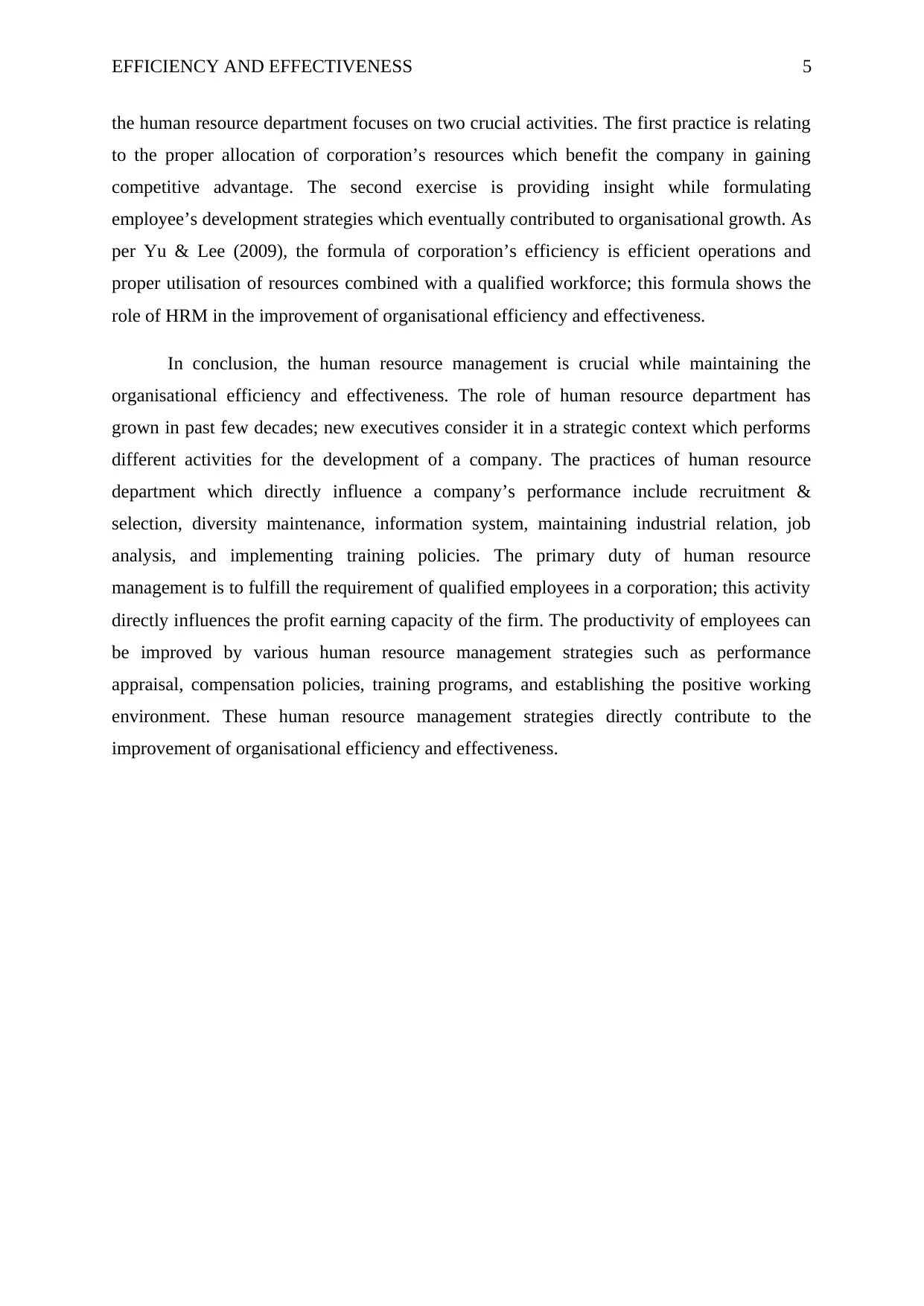
EFFICIENCY AND EFFECTIVENESS 5
the human resource department focuses on two crucial activities. The first practice is relating
to the proper allocation of corporation’s resources which benefit the company in gaining
competitive advantage. The second exercise is providing insight while formulating
employee’s development strategies which eventually contributed to organisational growth. As
per Yu & Lee (2009), the formula of corporation’s efficiency is efficient operations and
proper utilisation of resources combined with a qualified workforce; this formula shows the
role of HRM in the improvement of organisational efficiency and effectiveness.
In conclusion, the human resource management is crucial while maintaining the
organisational efficiency and effectiveness. The role of human resource department has
grown in past few decades; new executives consider it in a strategic context which performs
different activities for the development of a company. The practices of human resource
department which directly influence a company’s performance include recruitment &
selection, diversity maintenance, information system, maintaining industrial relation, job
analysis, and implementing training policies. The primary duty of human resource
management is to fulfill the requirement of qualified employees in a corporation; this activity
directly influences the profit earning capacity of the firm. The productivity of employees can
be improved by various human resource management strategies such as performance
appraisal, compensation policies, training programs, and establishing the positive working
environment. These human resource management strategies directly contribute to the
improvement of organisational efficiency and effectiveness.
the human resource department focuses on two crucial activities. The first practice is relating
to the proper allocation of corporation’s resources which benefit the company in gaining
competitive advantage. The second exercise is providing insight while formulating
employee’s development strategies which eventually contributed to organisational growth. As
per Yu & Lee (2009), the formula of corporation’s efficiency is efficient operations and
proper utilisation of resources combined with a qualified workforce; this formula shows the
role of HRM in the improvement of organisational efficiency and effectiveness.
In conclusion, the human resource management is crucial while maintaining the
organisational efficiency and effectiveness. The role of human resource department has
grown in past few decades; new executives consider it in a strategic context which performs
different activities for the development of a company. The practices of human resource
department which directly influence a company’s performance include recruitment &
selection, diversity maintenance, information system, maintaining industrial relation, job
analysis, and implementing training policies. The primary duty of human resource
management is to fulfill the requirement of qualified employees in a corporation; this activity
directly influences the profit earning capacity of the firm. The productivity of employees can
be improved by various human resource management strategies such as performance
appraisal, compensation policies, training programs, and establishing the positive working
environment. These human resource management strategies directly contribute to the
improvement of organisational efficiency and effectiveness.
⊘ This is a preview!⊘
Do you want full access?
Subscribe today to unlock all pages.

Trusted by 1+ million students worldwide
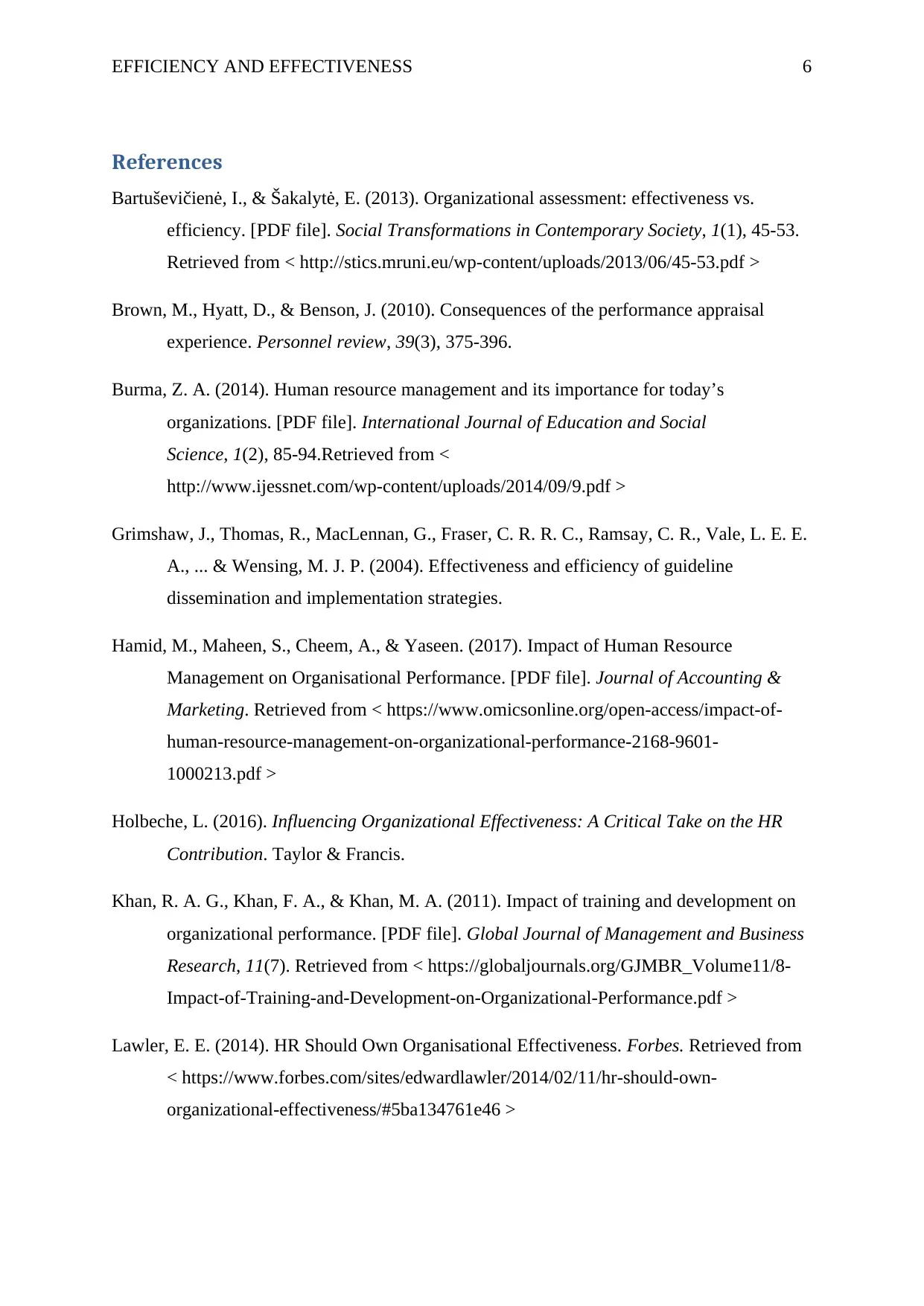
EFFICIENCY AND EFFECTIVENESS 6
References
Bartuševičienė, I., & Šakalytė, E. (2013). Organizational assessment: effectiveness vs.
efficiency. [PDF file]. Social Transformations in Contemporary Society, 1(1), 45-53.
Retrieved from < http://stics.mruni.eu/wp-content/uploads/2013/06/45-53.pdf >
Brown, M., Hyatt, D., & Benson, J. (2010). Consequences of the performance appraisal
experience. Personnel review, 39(3), 375-396.
Burma, Z. A. (2014). Human resource management and its importance for today’s
organizations. [PDF file]. International Journal of Education and Social
Science, 1(2), 85-94.Retrieved from <
http://www.ijessnet.com/wp-content/uploads/2014/09/9.pdf >
Grimshaw, J., Thomas, R., MacLennan, G., Fraser, C. R. R. C., Ramsay, C. R., Vale, L. E. E.
A., ... & Wensing, M. J. P. (2004). Effectiveness and efficiency of guideline
dissemination and implementation strategies.
Hamid, M., Maheen, S., Cheem, A., & Yaseen. (2017). Impact of Human Resource
Management on Organisational Performance. [PDF file]. Journal of Accounting &
Marketing. Retrieved from < https://www.omicsonline.org/open-access/impact-of-
human-resource-management-on-organizational-performance-2168-9601-
1000213.pdf >
Holbeche, L. (2016). Influencing Organizational Effectiveness: A Critical Take on the HR
Contribution. Taylor & Francis.
Khan, R. A. G., Khan, F. A., & Khan, M. A. (2011). Impact of training and development on
organizational performance. [PDF file]. Global Journal of Management and Business
Research, 11(7). Retrieved from < https://globaljournals.org/GJMBR_Volume11/8-
Impact-of-Training-and-Development-on-Organizational-Performance.pdf >
Lawler, E. E. (2014). HR Should Own Organisational Effectiveness. Forbes. Retrieved from
< https://www.forbes.com/sites/edwardlawler/2014/02/11/hr-should-own-
organizational-effectiveness/#5ba134761e46 >
References
Bartuševičienė, I., & Šakalytė, E. (2013). Organizational assessment: effectiveness vs.
efficiency. [PDF file]. Social Transformations in Contemporary Society, 1(1), 45-53.
Retrieved from < http://stics.mruni.eu/wp-content/uploads/2013/06/45-53.pdf >
Brown, M., Hyatt, D., & Benson, J. (2010). Consequences of the performance appraisal
experience. Personnel review, 39(3), 375-396.
Burma, Z. A. (2014). Human resource management and its importance for today’s
organizations. [PDF file]. International Journal of Education and Social
Science, 1(2), 85-94.Retrieved from <
http://www.ijessnet.com/wp-content/uploads/2014/09/9.pdf >
Grimshaw, J., Thomas, R., MacLennan, G., Fraser, C. R. R. C., Ramsay, C. R., Vale, L. E. E.
A., ... & Wensing, M. J. P. (2004). Effectiveness and efficiency of guideline
dissemination and implementation strategies.
Hamid, M., Maheen, S., Cheem, A., & Yaseen. (2017). Impact of Human Resource
Management on Organisational Performance. [PDF file]. Journal of Accounting &
Marketing. Retrieved from < https://www.omicsonline.org/open-access/impact-of-
human-resource-management-on-organizational-performance-2168-9601-
1000213.pdf >
Holbeche, L. (2016). Influencing Organizational Effectiveness: A Critical Take on the HR
Contribution. Taylor & Francis.
Khan, R. A. G., Khan, F. A., & Khan, M. A. (2011). Impact of training and development on
organizational performance. [PDF file]. Global Journal of Management and Business
Research, 11(7). Retrieved from < https://globaljournals.org/GJMBR_Volume11/8-
Impact-of-Training-and-Development-on-Organizational-Performance.pdf >
Lawler, E. E. (2014). HR Should Own Organisational Effectiveness. Forbes. Retrieved from
< https://www.forbes.com/sites/edwardlawler/2014/02/11/hr-should-own-
organizational-effectiveness/#5ba134761e46 >
Paraphrase This Document
Need a fresh take? Get an instant paraphrase of this document with our AI Paraphraser
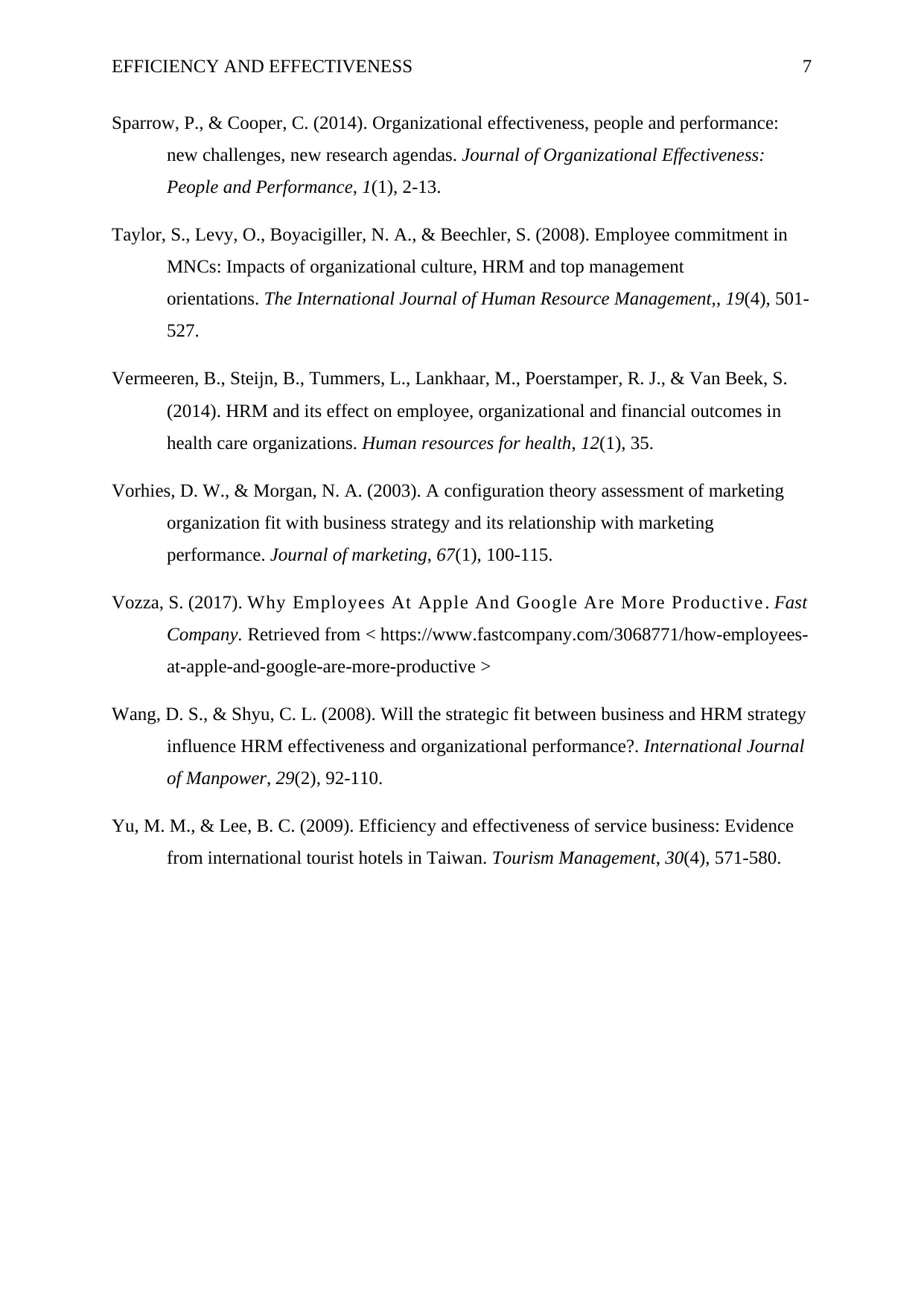
EFFICIENCY AND EFFECTIVENESS 7
Sparrow, P., & Cooper, C. (2014). Organizational effectiveness, people and performance:
new challenges, new research agendas. Journal of Organizational Effectiveness:
People and Performance, 1(1), 2-13.
Taylor, S., Levy, O., Boyacigiller, N. A., & Beechler, S. (2008). Employee commitment in
MNCs: Impacts of organizational culture, HRM and top management
orientations. The International Journal of Human Resource Management,, 19(4), 501-
527.
Vermeeren, B., Steijn, B., Tummers, L., Lankhaar, M., Poerstamper, R. J., & Van Beek, S.
(2014). HRM and its effect on employee, organizational and financial outcomes in
health care organizations. Human resources for health, 12(1), 35.
Vorhies, D. W., & Morgan, N. A. (2003). A configuration theory assessment of marketing
organization fit with business strategy and its relationship with marketing
performance. Journal of marketing, 67(1), 100-115.
Vozza, S. (2017). Why Employees At Apple And Google Are More Productive . Fast
Company. Retrieved from < https://www.fastcompany.com/3068771/how-employees-
at-apple-and-google-are-more-productive >
Wang, D. S., & Shyu, C. L. (2008). Will the strategic fit between business and HRM strategy
influence HRM effectiveness and organizational performance?. International Journal
of Manpower, 29(2), 92-110.
Yu, M. M., & Lee, B. C. (2009). Efficiency and effectiveness of service business: Evidence
from international tourist hotels in Taiwan. Tourism Management, 30(4), 571-580.
Sparrow, P., & Cooper, C. (2014). Organizational effectiveness, people and performance:
new challenges, new research agendas. Journal of Organizational Effectiveness:
People and Performance, 1(1), 2-13.
Taylor, S., Levy, O., Boyacigiller, N. A., & Beechler, S. (2008). Employee commitment in
MNCs: Impacts of organizational culture, HRM and top management
orientations. The International Journal of Human Resource Management,, 19(4), 501-
527.
Vermeeren, B., Steijn, B., Tummers, L., Lankhaar, M., Poerstamper, R. J., & Van Beek, S.
(2014). HRM and its effect on employee, organizational and financial outcomes in
health care organizations. Human resources for health, 12(1), 35.
Vorhies, D. W., & Morgan, N. A. (2003). A configuration theory assessment of marketing
organization fit with business strategy and its relationship with marketing
performance. Journal of marketing, 67(1), 100-115.
Vozza, S. (2017). Why Employees At Apple And Google Are More Productive . Fast
Company. Retrieved from < https://www.fastcompany.com/3068771/how-employees-
at-apple-and-google-are-more-productive >
Wang, D. S., & Shyu, C. L. (2008). Will the strategic fit between business and HRM strategy
influence HRM effectiveness and organizational performance?. International Journal
of Manpower, 29(2), 92-110.
Yu, M. M., & Lee, B. C. (2009). Efficiency and effectiveness of service business: Evidence
from international tourist hotels in Taiwan. Tourism Management, 30(4), 571-580.
1 out of 8
Related Documents
Your All-in-One AI-Powered Toolkit for Academic Success.
+13062052269
info@desklib.com
Available 24*7 on WhatsApp / Email
![[object Object]](/_next/static/media/star-bottom.7253800d.svg)
Unlock your academic potential
Copyright © 2020–2026 A2Z Services. All Rights Reserved. Developed and managed by ZUCOL.





